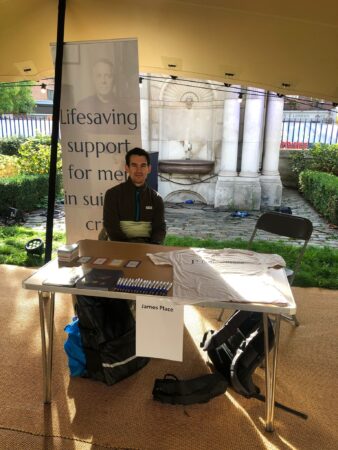Students and suicide
James' Place
09/03/23
Blog by Clare, Suicide Prevention Therapist, James’ Place Liverpool
Today is University Mental Health Day. We see many male students in suicidal crisis at our centres in Liverpool and London. In Liverpool, we have three universities in the city and a fourth on the outskirts. As a rough estimate, in the last few years I’ve been working as a suicide prevention therapist at James’ Place Liverpool, approximately 16% of my caseload has been students.

Students do present with a variety of issues, particularly at the start and end of term in my experience. Common issues we see are:
- Feelings of isolation and loneliness
- Worry and fear about failing their courses
- Worries about what to do after the completion of their course
- Problematic first intimate relationships – particularly the ending of these
- The impacts of alcohol and drug use
- Financial worries
For many students in their first or second year, there is a real contrast between their experience of the university life versus their expectations. The stereotype of university life being freeing, lots of partying, making friends for life and the opportunity for sexual contact with others is just not everyone’s experience in reality and this can be very distressing. At a time when university can present an opportunity to redefine who they are and figure out who they are as a young adult, many young men find that there are still experiencing that feeling of being ‘other than’ which for some is a repeat of their experience at school. They can often feel disappointed which contributes to low mood and distress. This distress can turn to suicidal thoughts as often young men don’t have good coping strategies in place for when they feel down. Whilst some do access the support of university welfare teams, many do not.
In terms of working with students, the cards we use as part of our treatment at James’ Place work really well with this group of men, who can struggle with expressing their thoughts and feelings. It is useful for us to explore the presenting issues but also what has contributed to an individual’s development of their self-concept, or identity. Who do they see themselves as? Unfortunately, many young men have experienced negative moments in their upbringing and education which has influenced their views about themselves. Low self-worth, low self-confidence, fears about their body/face/attractiveness to sexual partners, an internalised sense of not being enough or good enough all impact on an individual’s ability to manage the pressures of university and living independently from family or caregivers.
When I first started working with students at James’ Place I was surprised at first, how many young students struggling with their mental health were not aware of their ‘internal monologue’ – the voice that we all have in our heads making the commentary on our day, giving us advice good and bad, giving us random memories, ideas and thoughts. The brain gives us approximately 70,000 thoughts like this a day. I have worked with more than one individual who believed he had been hearing voices before we spoke about this so it is with relief that through our sessions, men are able to normalise this experience. We support them to begin to recognise and manage the unhelpful thinking that can contribute to suicide risk. These unhelpful thoughts are often filled with negative thoughts and comments about ourselves, and they increase in frequency and intensity when feeling low. I find, and know my colleagues echo this, that many men feel extreme relief that they can discuss the most scary of thoughts about suicide in a safe confidential space. Unlike with family members or friends the man doesn’t have the feeling that they are burdening the therapist. Fear of worrying or burdening others, especially loved ones who often perhaps live in another part of the country, is a major risk factor for suicide and in my experience this is one of the strongest factors in why men feel they have to suffer alone.
Every man that comes to see us at James’ Place, whether self-referred or referred by professionals has made a huge step in acknowledging their vulnerability and suffering to another human being. Having a place where they can talk without fear of judgement to a therapist who understands their experiences is life changing. We have to have honest conversations about what exactly is happening for that man for us to best understand their situation and their level of risk to themselves. This then helps us to work collaboratively with that man to find ways to keep them safe and to explore the presenting issues so they can find their way out of the crisis whilst supported by trained staff.
Suicide is a preventable death. At James’ Place we want to support men to find that hope and courage to come and speak about their worries. If you are a man or identify as male, live in Liverpool or London and feel you are in suicidal crisis please do contact us.
Clare, Suicide Prevention Therapist, James’ Place 
Our student outreach programme
To date, we have partnered with a number of London Universities including Queen Mary, London Metropolitan and University of Arts to reach the student community. Our work has seen us collaborate with student unions, residential services and attend a number of events including freshers fairs. This has increased engagement and knowledge of the help James’ Place provides to any male student encountering a suicidal crisis, giving them immediate access to the help they might need at anytime. Read more.


